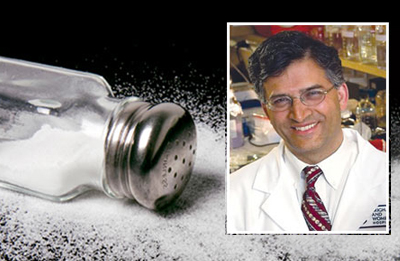Can a Salty Diet Put You at Risk for Autoimmune Disease?

BWH researchers demonstrate a surprising connection between salt and autoimmune diseases. Kuchroo photo courtesy of Frank Siteman Photography. |
Scientists Uncover a Connection, but More Research Needed
In a recent study, BWH researchers demonstrate a surprising connection between salt
and autoimmune diseases. The researchers observed that salt influences
susceptibility to autoimmune diseases such as multiple sclerosis, rheumatoid
arthritis, inflammatory bowel disease and more.
The team,
led by Vijay Kuchroo, DVM, PhD, co-director of the Infectious and
Immunologic Diseases Center at BWH's Biomedical Research Institute and Samuel L. Wasserstrom Professor of Neurology in BWH's
Department of Neurology, along with scientists from the Broad Institute,
Harvard University and Yale University, tested the connection between salt and
autoimmunity in pre-clinical and human models.
Kuchroo
and his team found that they could induce more severe forms of autoimmune
diseases, and at higher rates, in mice fed a high-salt diet than in those that
were fed a normal mouse diet.
Kuchroo
notes however that the high-salt diet alone did not cause autoimmune diseases.
"It's
not just salt, of course," said Kuchroo. "We have this genetic architecture-genes
that have been tied to various forms of autoimmune diseases, and predispose a
person to developing autoimmune diseases."
Leading up to the Salt Discovery
Arriving
at the salt discovery involved first understanding the genetic architecture and
molecular growth of immune cells called Th17
cells. The researchers explored just exactly what the right activity levels
of these cells should be-too little activity leaves a person vulnerable to
foreign invaders like fungal infections, but too much activity can harm the
body and lead to autoimmune diseases.
The
researchers took 18 snapshots of developing Th17 cells to see what was
happening inside them as they developed. Then, one-by-one, they ‘silenced'
genes responsible for making these cells, using specially developed silicon
nanowires to pierce the cells and delete key genes.
They
discovered that Th17 cells were governed by two networks working in opposition
to one another to both suppress and promote Th17 cell creation. One particular
gene, known as SGK1, played an
important role in the cells' development, and when turned off in mice, Th17
cells were not produced. SGK1 had not
been observed in T cells before, but had been found in gut and kidney cells
where it plays a role in absorbing salt.
Hence
when the Kuchroo lab further explored this observation by feeding mice a
high-salt diet, the presence of the SGK1 gene/protein in immune cells prompted
a heightened response leading to autoimmune disease.
Next Steps
In spite
of having discovered a salt-loving gene that is usually found in gut cells to
also exist in and influence immune cell activity to a point where it induces severe
forms of autoimmune diseases, the researchers note that there is still more to
uncover and that they still need to directly test the impact of a high-salt
diet on human autoimmune disease.
"We also
suspect that environmental factors-infection, sunlight, smoking and vitamin D-may
play a role. Salt could be one more thing on the list of predisposing
environmental factors that may promote the development of autoimmunity," said
Kuchroo.
Researchers
caution that it is still premature to claim that people should not consume salt
because it puts them at risk for autoimmune disease. The connection between
salt and autoimmune disease needs to be further studied.
To view an
interview with the researchers by the Broad Institute, visit http://youtu.be/t6lsucTFnB4.